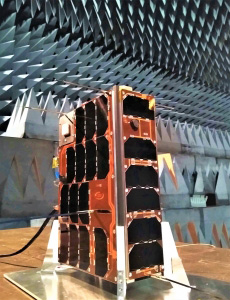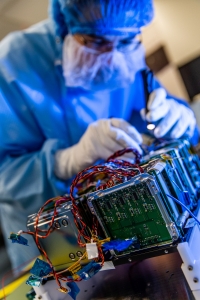From both a civil and military perspective our society has become dependent on satellites orbiting our planet. For example, satellites enable the usage of navigation and communications systems. The use of satellite systems for military purposes encompasses both opportunities and threats.
NATO already underlined the importance of the usage of Space at the end of 2019 in declaring Space as an operational domain. The Dutch Ministry of Defence recognizes this. The ‘Defence Vision 2035’ describes, amongst other things, the usage of space as an indispensable link within an information driven Armed Forces.
In cooperation with Dutch industry and knowledge institutes – such as Royal NLR – the choice has been made to explore scalable and affordable capacities for military usage of space. Nanosatellites, slightly bigger than a milk carton, are less expensive than the traditional and bigger satellites and can be launched into orbit on a bigger scale which results in less vulnerable and more redundant system. BRIK-II is a nanosatellite in which the partners who are involved want to demonstrate that a satellite like BRIK-II is effective for relevant (military) information and communication applications.
Stronger together
The construction of BRIK-II underlines the innovative abilities the Dutch industry and knowledge institutes are capable of in developing relevant military and/or dual use capacities. The company Innovative Solutions in Space (ISISPACE) located in Delft is the designer and integrator of the nanosatellite.
Royal NLR has developed new technologies that will be put into practice on the BRIK-II: with a miniaturized payload, in the field of signal intelligence, the satellite can detect radio signals from space and locate the location of the source on the earth’s surface.
Furthermore there is a collaboration with the Delft University of Technology (TU Delft) and an international collaboration with the University of Oslo. The US-based company Virgin Orbit has been selected to carry out the launch of BRIK-II.
BRIK-II
Not entirely coincidentally the first Dutch nanosatellite has been named BRIK-II. This name symbolizes the development of the Dutch aerospace since 1913. That year Marinus van Meel built ‘The BRIK’ which was the first aircraft for the ‘Luchtvaartafdeeling’ (nowadays known as Royal Netherlands Air Force) in Soesterberg. This plane was used by the Dutch Armed Forces to explore the domain of aviation. To commemorate his pioneering spirit, the first nanosatellite gets the honorable name of BRIK-II.





